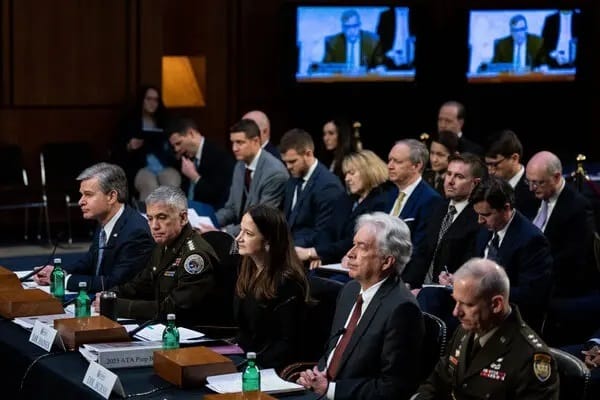
"There aren’t enough secrets to go round anymore. Some spies are having to invent secrets in order to earn a living."
Geopolitical Update: Monday, March 18, 2024:
U.S. Intelligence Report Reveals Global Security Challenges and Election Interference Risks

Bottom Line Up Front (BLUF):
The U.S. Intelligence Community (IC) released its annual threat assessment report, shedding light on major global challenges and potential risks to U.S. national security. China, Russia, and Iran feature prominently, with warnings about foreign interference in the 2024 U.S. elections. While China's capabilities are highlighted, the report also underscores Beijing's cautious approach and concerns about U.S. power. Russia seeks alliances but is assessed to avoid direct military conflict with NATO. Iran's involvement in recent events, like the Hamas attack on Israel, raises questions about its role in the region. The report emphasizes the delicate balance between defense measures and provocation in global relations.
Key Developments:
China's Strategic Posture: The IC report puts China at the forefront of U.S. security concerns, citing its advanced technology, cyber capabilities, and military strength. However, it notes China's cautious approach, indicating a preference for reducing tensions with the U.S. while safeguarding its core interests. Insecurity about U.S. power drives China's assertiveness, especially regarding military capabilities and nuclear modernization.
Russian Ambitions and Alliances: Russia's cooperation with China, Iran, and North Korea raises concerns. However, the report cautions against overstating these alliances. While joint military activities signal collaboration, interoperability remains limited. The report downplays fears of a direct military conflict between Russia and NATO but warns of Russia's nuclear saber-rattling, particularly in the context of the Ukraine conflict.
Iran's Role in Regional Dynamics: The IC's assessment on Iran highlights its involvement in proxy conflicts, including support for groups like Hamas, Hezbollah, and the Houthis. Despite speculation, the report suggests Iranian leaders lacked foreknowledge of specific events, such as the Hamas attack on Israel. This raises questions about Iran's actual influence in regional conflicts.
Foreign Interference in U.S. Elections: The IC warns of potential election interference by Russia, China, and Iran. This underscores the need for vigilance. While efforts to deter interference are crucial, the report acknowledges the delicate balance between defense measures and perceived aggression, which could escalate tensions further.
Analysis:
The IC's threat assessment provides valuable insights into the complex dynamics shaping global security. China's rise as a strategic competitor is evident; yet the report highlights nuances in Beijing's behavior. It emphasizes its pragmatic approach to U.S. relations. Russia's efforts to bolster alliances underscore its desire for influence, and caution prevails in direct confrontations with NATO. Iran's role in regional conflicts remains contentious, with the report offering nuanced perspectives on its involvement.
Foreign interference in U.S. elections represents a persistent challenge, requiring comprehensive strategies to safeguard democratic processes without exacerbating international tensions. The delicate balance between defense measures and escalation risks underscores the importance of nuanced policymaking in addressing global threats.
Global Implications:
The IC's assessment reverberates beyond U.S. borders, shaping international perceptions of geopolitical dynamics. China's cautious yet assertive stance influences regional security dynamics. Russia's alliances and nuclear posturing impact European security concerns. Iran's role in regional conflicts adds complexity to Middle Eastern dynamics, potentially influencing broader regional stability.
The specter of foreign interference in elections extends beyond the U.S., highlighting the need for international cooperation in safeguarding democratic processes and countering disinformation campaigns. The IC's findings contribute to a broader understanding of global security challenges, informing multilateral efforts to address shared threats.
Look Ahead:
As the global security landscape evolves, attention will focus on how key actors respond to the findings of the IC's threat assessment. Diplomatic engagement, strategic partnerships, and defense measures will play critical roles in mitigating risks and managing tensions. The upcoming U.S. elections will serve as a litmus test for efforts to counter foreign interference, and underscores the importance of robust cybersecurity measures and international cooperation.
Ongoing developments in China, Russia, and Iran will continue to shape regional and global dynamics. This necessitates adaptive strategies and proactive engagement by policymakers. Attention to nuanced assessments and diplomatic initiatives will be crucial in navigating complex geopolitical challenges and safeguarding international stability.
Analyst Comments:
The IC's threat assessment offers valuable insights into the evolving nature of global security challenges. China's strategic ambitions, Russia's alliance-building efforts, and Iran's regional dynamics highlights the complexity of contemporary geopolitics. Effective response strategies must balance deterrence with diplomacy, recognizing the nuances of each actor's motivations and capabilities.
Foreign interference in elections represents a multifaceted threat that demands a comprehensive response. As we look ahead, international cooperation and information-sharing will be critical in countering disinformation campaigns and safeguarding democratic processes. Addressing underlying vulnerabilities requires a nuanced approach.

Stay safe out there
